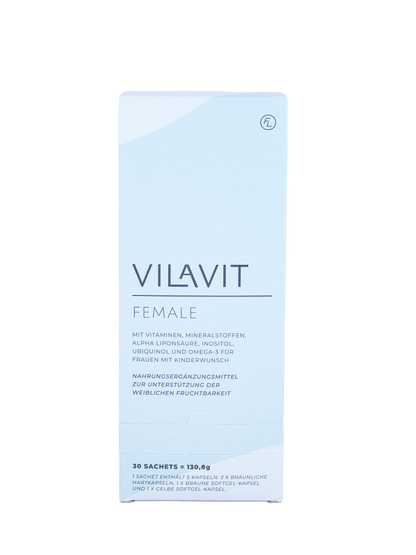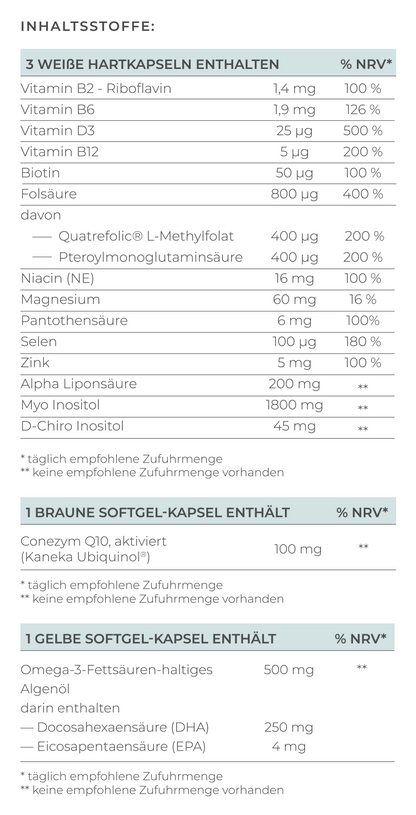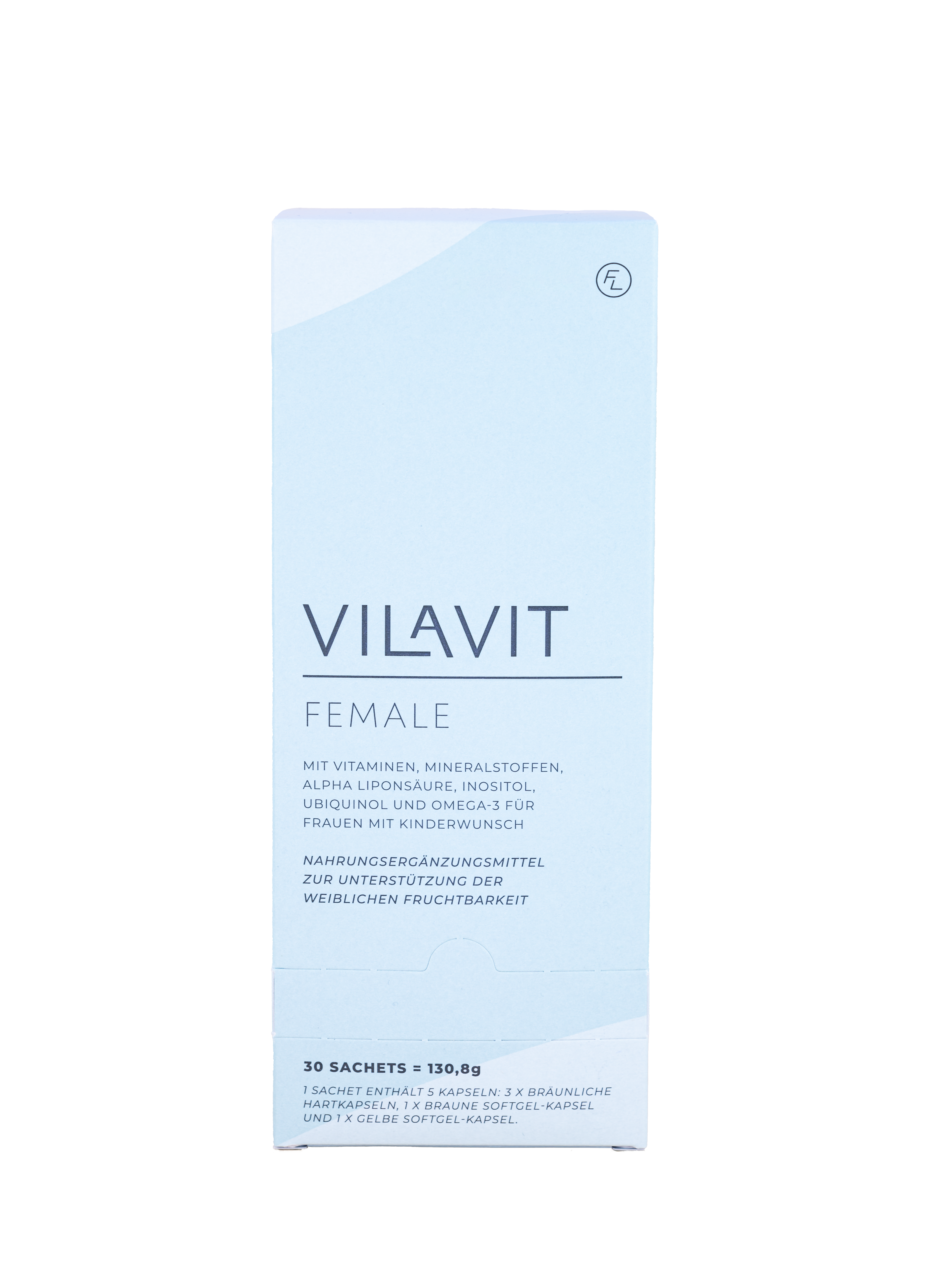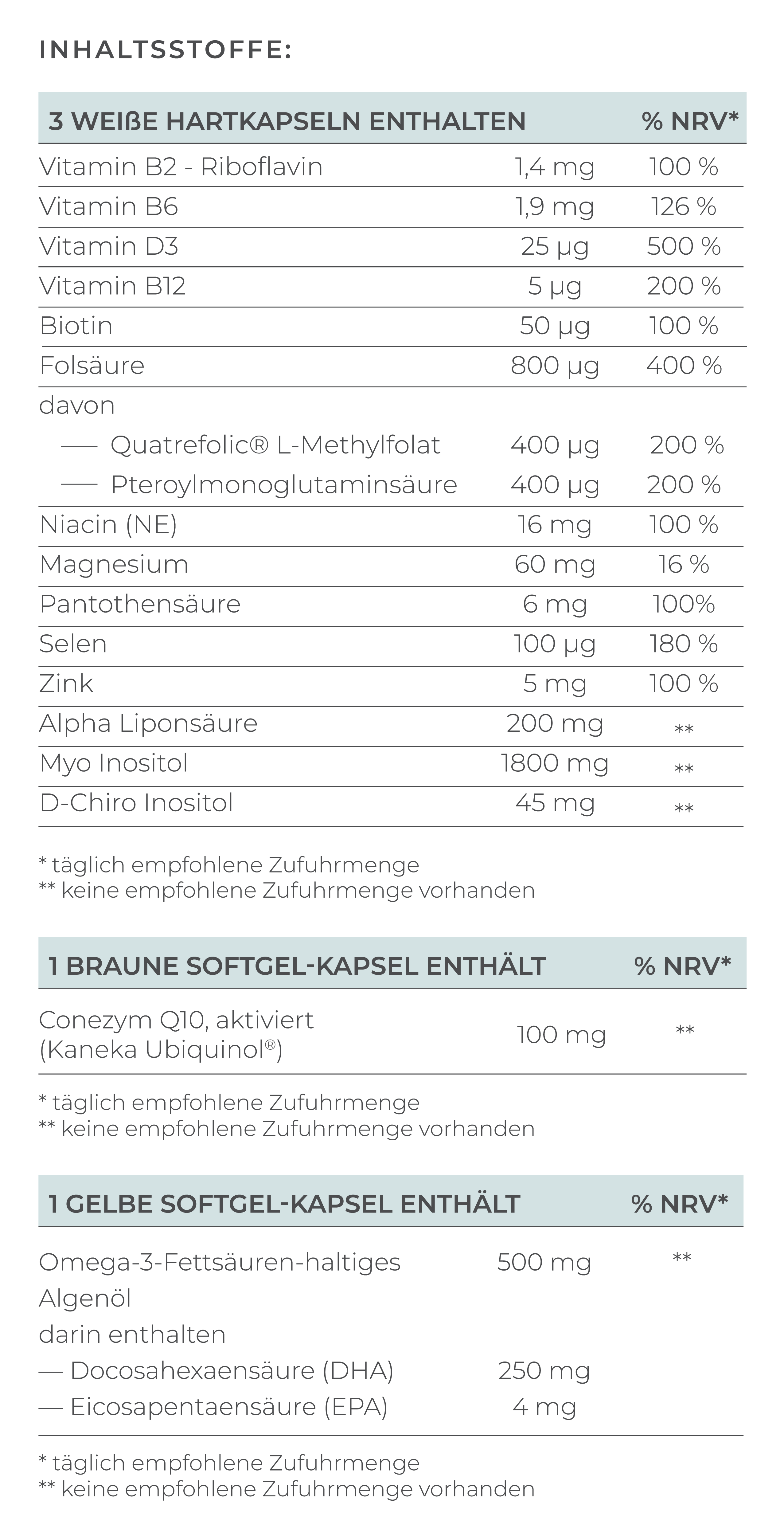The most important facts about "weight loss drug" and fertility
-
More and more women are reporting becoming pregnant while using a "weight loss drug"
-
"weight loss drug" are actually GLP-1 antagonists for the treatment of diabetes
-
They owe their name "weight loss drug" to an (original) side effect that promotes weight loss
-
According to initial studies, "weight loss drug" could have a positive effect on fertility in a variety of ways
-
However, experts currently advise against using them during pregnancy and fertility journeys
More and more women are reporting on the Internet that they have become pregnant thanks to drugs such as Ozempic® or Wegovy®. These drugs with GLP-1 antagonists were actually intended for the treatment of diabetes before they were used for weight loss and now slowly for the unfulfilled desire to have children. But are these supposed successes really cause for celebration or should women who wish to have children refrain from treatment with these drugs?
What were “weight loss drugs” originally developed for?
Drugs such as Ozempic®, Wegovy® or Mounjaro® are so-called glucagon-like peptide-1 analogs (GLP-1 analogs), which stimulate insulin secretion in the beta cells of the pancreas and reduce glucagon secretion. For this reason, GLP-1 analogs have been used to treat diabetes patients. However, GLP-1 analogs also influence food intake by stimulating neurons in the satiety center of the brain, for example, reducing hunger and food cravings. (Liu Q. K., 2024; AKDAE 2024)
These side effects of GLP-1 analogs mean that these drugs promote weight loss and have earned them the nickname “weight loss drugs”.
An important warning before we get started
This blog can give hope to many couples who are trying to conceive. It is therefore very important for us to issue a warning from the outset, as there are currently not enough studies on the topic of GLP-1 analogs in pregnancy. For this reason, no GLP-1 analogs are approved or recommended for use during pregnancy (or breastfeeding). Most drugs should be discontinued at least 2 months before pregnancy. At the end of the blog, we explain in more detail what the risks of “weight loss injections” are in terms of fertility. Therefore, even if it may be difficult for some people, you should always discuss treatment with GLP-1 analogs with a specialist and seek advice on suitable alternative treatments that are also suitable during pregnancy.
How do “weight loss drugs” improve female fertility?
Numerous women have reported becoming unintentionally pregnant during treatment with such injections despite using hormonal contraceptive methods such as the birth control pill. The Drug Commission of the German Medical Association attributes this to the frequent side effects of the medication, such as diarrhea and vomiting, which can impair the effectiveness of hormonal contraceptives. (AKDAE 2024)
This naturally raises the question of whether “weight loss drugs” only reduce the effectiveness of contraceptives or can actually improve fertility. We take a look at what science has to say:
“Weight loss drugs” in obese women who wish to have children
GLP-1 analogs often lead to weight loss as mentioned initially. Women with obesity have a higher risk of miscarriage. In addition, obesity increases the risk of anovulatory infertility, i.e. infertility caused by a lack of ovulation. (ASRM, 2021)
Weight loss (also by means of GLP-1 analogs) and the associated improvement in metabolism can therefore not only increase fertility but also the chance of having a healthy baby. (AKDAE, 2024)
“Weight loss drugs” for PCOS and the desire to have children
Many patients with PCOS (polycystic ovary syndrome) struggle with obesity, which is why the effect of losing weight can benefit them. Studies also show that testosterone levels in women with PCOS fall, insulin sensitivity increases, and menstruation is more regular thanks to GLP-1 analogs. (Cena, H., et al., 2020)
GLP-1 analogs could therefore one day be a promising therapy for fertility patients with PCOS.
“Weight loss drugs” for diabetes and the desire to have children
As diabetes is a hormonal imbalance, other hormones that are important for fertility can also be disrupted in diabetes patients. For example, ovulation or nidation (i.e. implantation of the embryo) may be impaired. GLP-1 analogs could also be a therapeutic approach here. Apart from this, diabetes patients naturally also need reliable treatment for their diabetes during pregnancy and breastfeeding. So, if you have diabetes and are currently being treated with GLP-1 analogs, we strongly recommend that you consult your doctor (if possible) before becoming pregnant. It may be advantageous to change your therapy and medication before becoming pregnant. (AKDAE, 2024)
“Weight loss drugs” to improve male fertility
Initial studies suggest that treatment with GLP-1 analogs can improve the fertility of overweight men. However, the underlying mechanisms are still poorly understood. Scientists suspect that GLP-1 analogs interfere with glucose homeostasis and energy metabolism - two important processes in spermatogenesis. The use of GLP-1 analogs appears to improve sperm metabolism, sperm motility, sperm concentration and sperm count. However, the direct effects of GLP-1 therapy - including on male hormones - have not yet been investigated. (Varnum, A. A., et al., 2023)
For this reason, therapy with GLP-1 analogs to improve fertility is currently hardly recommended for men either.
What happens to the baby when a pregnant woman is treated with GLP-1 analogs?
Results from animal studies
Mouse studies have shown that GLP-1 analogs lead to reduced fetal weight and growth during pregnancy, delay ossification, and promote variations (malformations) in the skeleton and visceral malformations. (Varughese, M. S., et al., 2025)
Treatment with GLP-1 analogs in early pregnancy
GLP-1 analogs are relatively large molecules. For this reason, it is assumed that the molecule is less likely to cross the placental barrier and thus reach the unborn child. A study of 5000 pregnant women with type 2 diabetes found no increased risk of serious congenital malformations in women who were treated with GLP-1 analogues during the fertilization period. Another study investigated the effects of (unintentional) use of GLP-1 analogs in the first trimester and also found no specific pattern of birth defects. (Varughese, M. S., et al., 2025)
Congenital anomalies associated with GLP-1 therapy during pregnancy
Very few reports of congenital anomalies are currently available, but a wide variety of congenital anomalies have been diagnosed where the pregnant woman has come into contact with GLP-1 analogs. (Varughese, M. S., et al., 2025)
It is therefore currently difficult to assess exactly how GLP-1 analogs affect the unborn child. Due to this lack of knowledge and understanding of the effect, the use of GLP-1 analogs in or within two months before pregnancy is not recommended.
Conclusion
Treatment with GLP-1 analogs could be a promising therapy for both women and men who wish to have children. However, further studies are needed to understand and confirm the effectiveness of these drugs on fertility and to ensure their safety.
Frequently asked questions
What are “weight loss drugs” and how do they work?
“Weight loss drugs” are mostly GLP-1 analogs and have been developed for the treatment of diabetes. The promotion of weight loss is actually a side effect that has proven to be a curse for some and a blessing for others. Among other things, they promote insulin production, inhibit glucagon and delay gastric emptying.
Which drugs are GLP-1 analogs?
The best-known GLP-1 analogs and their analogs that are approved in the EU are:
- Approved for type 2 diabetes and obesity:
- Wegovy® (GLP-1 analogs: semaglutide)
- Saxenda® (GLP-1 analogs: liraglutide)
- Mounjaro® (GLP-1 analogs: tirzepatide)
- Approved for type 2 diabetes (not for obesity):
- Ozempic® (GLP-1 analogs: semaglutide)
- Trulicity ® (GLP-1 analogs: dulaglutide)
- Byetta® (GLP-1 analogs: exenatide)
- Bydureon® (GLP-1 analogs: exenatide)
- Lyxumia® (GLP-1 analogs: lixisenatide)
How can “weight loss drugs” influence the desire to have children?
In women, “weight loss drugs” appear to work primarily by improving weight management, stabilizing hormone levels in women with obesity or PCOS, regulating the menstrual cycle and increasing the likelihood of ovulation. Animal studies have also shown a direct effect on the production of luteinizing hormone (LH).
Much less research has been done into the effect of “weight loss drugs” on men. However, initial studies have shown that sperm quality can be improved by taking GLP-1 analogs.
Are there any risks associated with the use of “weight loss drugs” during pregnancy?
Yes, the use of “weight loss drugs” is not recommended during pregnancy, as there is insufficient data, and certain abnormalities have occurred frequently in animal studies. If you are planning a pregnancy, you should therefore discontinue the use of “weight loss drugs” at least two months before becoming pregnant.
If you become pregnant while taking the “weight loss drugs”, you should speak to your doctor immediately.
Can I use “weight loss drugs” during IVF treatment?
There is no recommendation or approval for use during IVF treatment - just as with natural conception. It is therefore essential that you discuss such a treatment with your doctor.
References
-
Liu Q. K. (2024). Mechanisms of action and therapeutic applications of GLP-1 and dual GIP/GLP-1 receptor agonists. Frontiers in endocrinology, 15, 1431292.
-
Practice Committee of the American Society for Reproductive Medicine & Practice Committee of the American Society for Reproductive Medicine (2021). Obesity and reproduction: a committee opinion. Fertility and sterility, 116(5), 1266–1285.
-
Cena, H., Chiovato, L., & Nappi, R. E. (2020). Obesity, Polycystic Ovary Syndrome, and Infertility: A New Avenue for GLP-1 Receptor Agonists. The Journal of clinical endocrinology and metabolism, 105(8), e2695–e2709.
-
Varughese, M. S., O'Mahony, F., & Varadhan, L. (2025). GLP-1 receptor agonist therapy and pregnancy: Evolving and emerging evidence. Clinical medicine (London, England), 25(2), 100298.
-
Varnum, A. A., Pozzi, E., Deebel, N. A., Evans, A., Eid, N., Sadeghi-Nejad, H., & Ramasamy, R. (2023). Impact of GLP-1 Agonists on Male Reproductive Health-A Narrative Review. Medicina (Kaunas, Lithuania), 60(1), 50.







































